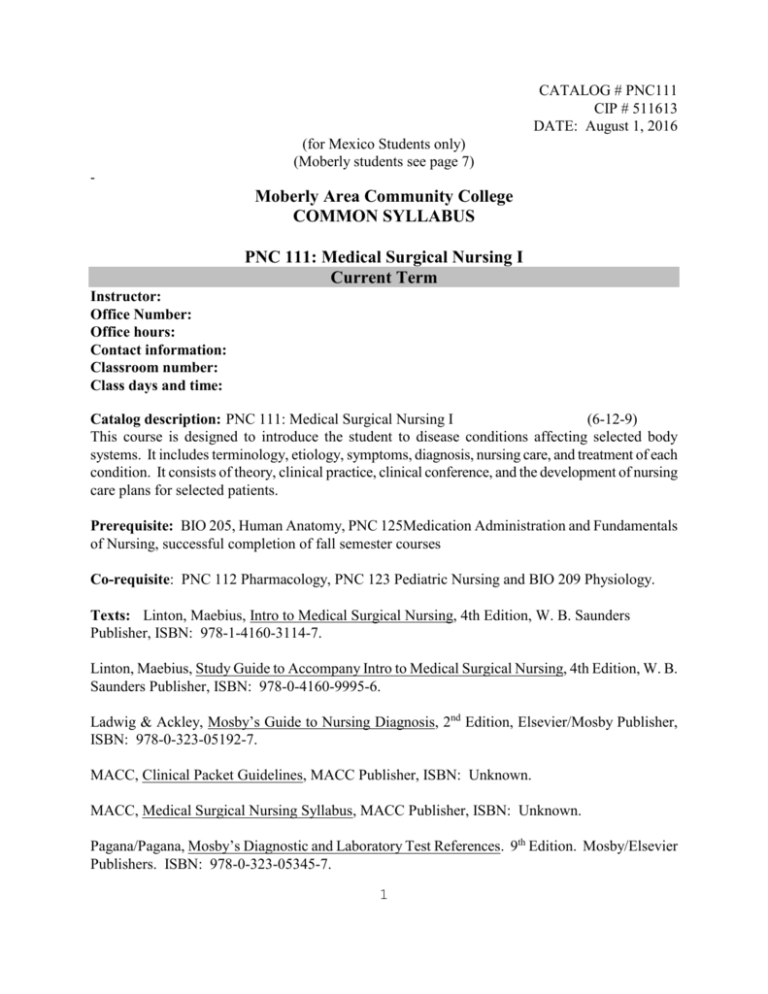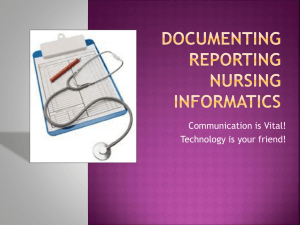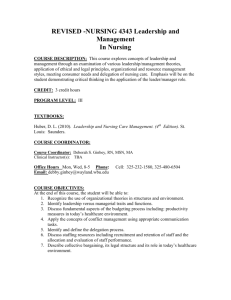
CATALOG # PNC111
CIP # 511613
DATE: August 1, 2016
(for Mexico Students only)
(Moberly students see page 7)
-
Moberly Area Community College
COMMON SYLLABUS
PNC 111: Medical Surgical Nursing I
Current Term
Instructor:
Office Number:
Office hours:
Contact information:
Classroom number:
Class days and time:
Catalog description: PNC 111: Medical Surgical Nursing I
(6-12-9)
This course is designed to introduce the student to disease conditions affecting selected body
systems. It includes terminology, etiology, symptoms, diagnosis, nursing care, and treatment of each
condition. It consists of theory, clinical practice, clinical conference, and the development of nursing
care plans for selected patients.
Prerequisite: BIO 205, Human Anatomy, PNC 125Medication Administration and Fundamentals
of Nursing, successful completion of fall semester courses
Co-requisite: PNC 112 Pharmacology, PNC 123 Pediatric Nursing and BIO 209 Physiology.
Texts: Linton, Maebius, Intro to Medical Surgical Nursing, 4th Edition, W. B. Saunders
Publisher, ISBN: 978-1-4160-3114-7.
Linton, Maebius, Study Guide to Accompany Intro to Medical Surgical Nursing, 4th Edition, W. B.
Saunders Publisher, ISBN: 978-0-4160-9995-6.
Ladwig & Ackley, Mosby’s Guide to Nursing Diagnosis, 2nd Edition, Elsevier/Mosby Publisher,
ISBN: 978-0-323-05192-7.
MACC, Clinical Packet Guidelines, MACC Publisher, ISBN: Unknown.
MACC, Medical Surgical Nursing Syllabus, MACC Publisher, ISBN: Unknown.
Pagana/Pagana, Mosby’s Diagnostic and Laboratory Test References. 9th Edition. Mosby/Elsevier
Publishers. ISBN: 978-0-323-05345-7.
1
Rinehart. Exam Cram NCLEX PN with CD 2nd Edition. Pearson Publishers. ISBN: 978-0-78973706-9.
Other required materials/facilities:
Identified clinical and observation sites.
Purpose of course: This course is designed to introduce the student to disease conditions affecting
selected body systems. It includes terminology, etiology, symptoms, diagnosis, nursing care, and
treatment of each condition.
Course Objectives:
After completion of the didactic content, the student should be able to:
1.
2.
3.
4.
5.
6.
7.
8.
9.
10.
11.
12.
13.
14.
15.
16.
17.
18.
Define applicable terminology.
Identify the leadership roles in the health care team.
Identify communication principles used by the Practical Nurses to establish and
maintain therapeutic interpersonal relationship with clients.
Describe a plan of care for general preparation of a client who is to have surgery,
including psychological care and preparing for postoperative activities.
Discuss nursing interventions in the care of clients immediately following surgery.
Describe appropriate nursing interventions to achieve the expected outcomes
common to all clients during the postoperative phase.
Discuss ways the nurse can assist the family of the surgical client.
Compare normal anatomy and physiology to pathological changes that occur in
disease processes of each body system.
Identify social and cultural attitudes toward death.
Discuss the stages of death; the physical, emotional, and spiritual needs of the dying
client; and the phases of grief and bereavement of significant others.
Identify common pathogens, their transmission, and the body's physiologic defense
mechanisms.
Describe common causes, clinical manifestations, pathophysiology, compensatory
mechanism and therapeutic and nursing management of fluid and electrolyte
imbalances.
Identify the risk factors and predominant characteristics of cancer, its prevention, and
various treatment modalities.
Explain procedures and purpose of specific diagnostic procedures relating to each
body system.
Describe nursing interventions related to specific therapeutic techniques for each
body system.
Discuss the etiology, symptoms, treatment, and nursing management of specific
diseases affecting each body system.
Develop a plan of care utilizing the nursing process to identify and manage the
spiritual, emotional, cultural, and physical needs of the client.
Identify the application, use and complications associated with IV therapy related to
each unit in this course.
2
Upon completion of the psychomotor/clinical content, the student will be able to:
1.
2.
3.
4.
5.
6.
7.
8.
9.
10.
11.
12.
13.
14.
15.
16.
17.
18.
19.
20.
21.
22.
Practice fundamental nursing procedures efficiently, accurately, and emphasizing patient
individuality.
Assess holistic need of assigned patient with assistance from instructor and/or hospital staff.
Chart appropriately and accurately.
Develop sensitivity to changing patient conditions and needs-react and report appropriately.
Organize clinical assignments for best utilization of time.
Choose communication technique to meet needs of patients who have physical and mental
barriers to ordinary communication.
Develop a Nurse-Patient relationship.
Identify and accept positive and negative patient behavior.
Identify specific manifestations of disease condition in assigned patients, including; etiology,
signs and symptoms, diagnostic measures, treatment and nursing care.
Promote safety through prevention of accident and control of infections.
Practice appropriate body mechanics.
Practice the concept of preventative rehabilitation in relation to associated ill effects of bed
rest and inactivity.
Prepare patients for discharge by assisting with and evaluating appropriate patient teaching.
Prepare and administer medication to a nursing team for two days-practicing safety and
accuracy. Complete a drug summary for each medication administered.
Employ appropriate nursing measures in caring for patients during the preoperative and
postoperative phase of surgical nursing.
Demonstrate a professional attitude through manner of speech, courtesy, tact, and dignity.
Recognize the importance of good personal health to the nurse’s role as a health teacher and
health care provider.
Modify clinical behavior when necessary.
Utilizing the nursing process, develop plans for nursing care on selected patients.
Complete a "Special Area Assignment Form" for each special area experience.
Summarize pertinent information concerning patient assignments during clinical conference
Demonstrate the ability to work cooperatively with all health care team members, fellow
students, and faculty.
Course content:
UNIT I:
UNIT II:
Physiological Aspects of Patient Care
A.
Major Causes of Illness and Disease
B.
Characteristics of Four Types of Microorganisms
C.
Other Causes of Disease
D.
Physiologic Defense Mechanisms
E.
Intravenous Therapy
Preoperative and Postoperative Care/The Patient With Pain
A.
The Surgical Experience
B.
Preoperative Preparation
C.
Intraoperative Care
3
UNIT III:
D.
Postoperative Assessment, Intervention, and Discharge Planning
E.
Postoperative Complications
F.
The Nature of Pain
G.
Pain Management
H.
Intravenous Therapy
Fluid and Electrolyte Imbalance
A.
The Nature of Body Fluids
B.
Fluid and Electrolyte Exchange and Imbalances
C.
Acid-Base Imbalance
D.
Intravenous Therapy
E.
Types and Treatment of Shock
UNIT IV:
Infections
A.
Characteristics of Infections Process
B.
Control of Communicable Disease
C.
The Patient With Diseases (Bacterial, Viral, Rickettsial, Protozoal)
D.
STD
E.
Nosocomial Infections-Preventions and Control
F.
Immunity
1.
Excessive immune response
2.
Deficient immune response
3.
Care of patients with immune deficiencies
G.
Chemotherapeutic Agents
H.
Intravenous Therapy
UNIT V:
Death and the Dying Patient
A.
Terms Associated With Death
B.
Emotional Stages of Dying
C.
Grief and Bereavement
D.
Nursing Care of the Dying Patient and Surviving Family
UNIT VI:
The Patient With Cancer
A.
Overview
B.
Causes
C.
Prevention, Control, Treatment
D.
Emotional Care
E.
Intravenous Therapy
UNIT VII:
Problems Affecting Respiration
A.
Assessment of the Patient With a Respiratory Problem
B.
Diagnostic Procedures and Therapeutic Techniques
C.
Diseases and Disorders
D.
Obstruction
E.
Surgery and Chest Wounds
F.
Rehabilitation
4
G.
UNIT VIII:
Intravenous Therapy
Problems Affecting Endocrine Function
A.
Nursing Assessment
B.
Diagnostic Tests and Therapeutic Techniques
C.
Disease and Disorders
D.
Treatments and Nursing Care
E.
Intravenous Therapy
General notes: Library assignments, periodicals, current events, and guest speakers may be utilized
as appropriate throughout the course.
Program outcomes and assessment: The practical nursing faculty continually strives to meet the
needs of the practical nursing student through program improvements. This is a cooperative effort
that includes input from the faculty, students, the Practical Nursing Advisory Board and other
appropriate agencies or entities. Students are assessed on mastery of the course concepts and
essential skills throughout the courses of the Practical Nursing program. Other program assessments
are part of the Comprehensive Nursing Assessment Plan that includes clinical performance criteria,
essential skills mastery, the clinical process evaluation, NCLEX-PN testing, successful licensure,
placement rates, follow-up surveys, and approval by the Missouri State Board of Nursing.
Instructor policies/expectations:
Academic Dishonesty: MACC board policy is as follows: “Academic dishonesty by students
damages institutional credibility and unfairly jeopardizes honest students; therefore, it will not be
tolerated in any form.” Forms of academic dishonesty include but are not limited to the following:
violations of copyright law, plagiarism, fabrication, cheating, collusion, and other academic
misconduct. Incidents of dishonesty regarding assignments, examinations, classroom/laboratory
activities, and/or the submission of misleading or false information to the College will be treated
seriously. The procedure for handling academic dishonesty is outlined in the Student Handbook
(Policy Handbook M.010). In cases of alleged academic dishonesty, the burden of proof is on the
student, not on the instructor.
Attendance: Students are expected to attend all classes and clinical practice. Absences will be
considered on an individual basis within the guidelines outlined in the student handbook. Clinical
absences may require attendance on a make-up day.
Tardies, make-up, and late work:
Refer to the PN handbook for general instructions. Your presence for shift report at the start of the
clinical day is extremely important. Tardies in excess of 30 minutes in the clinical area may result in
the student being sent home.
Grading/Student Assessment:
Final grade will be composed of:
1.
A minimum of eight unit tests, quizzes and written assignments.
2.
Final comprehensive examination.
5
3.
4.
5.
Clinical evaluation-grade of 78% must be achieved to pass the course.
Nursing care plans and other written assignments
IV therapy post-test-must achieve a grade of 80% to successfully pass the IV therapy
portion of med-surg theory. Two attempts will be allowed to achieve this score, but
failure to achieve a score of 80% on this test will result in failure of the Med-Surg
course.
See grading policy of Moberly Area Community College Practical Nursing Handbook for
Moberly and Mexico programs.
Refer to student handbook for the following policies:
Drop policy
Drug/alcohol policy
Grade appeal procedure
Student code of conduct
Student due process and grievance procedure
Student rights and privacy act
Use of computing resources
Americans With Disabilities Act Statement
Students with documentable disabilities as addressed by the Americans with Disabilities Act may
register proper documentation with the Office of Student Services. The Student Services Office will
then notify appropriate instructors of suggested official accommodations. Students may also wish to
personally inform their instructors of their particular disabilities.
6
CATALOG # PNC111
CIP # 511613
DATE: August 1, 2016
-
Moberly Area Community College
COMMON SYLLABUS
PNC 111: Medical Surgical Nursing I
Current Term
Instructor:
Office Number:
Office hours:
Contact information:
Classroom number:
Class days and time:
Catalog description: PNC 111: Medical Surgical Nursing I
(6-12-9)
This course is designed to introduce the student to disease conditions affecting selected body
systems. It includes terminology, etiology, symptoms, diagnosis, nursing care, and treatment of each
condition. It consists of theory, clinical practice, clinical conference, and the development of nursing
care plans for selected patients.
Prerequisite: BIO 205, Human Anatomy, PNC 125Medication Administration and Fundamentals
of Nursing, successful completion of fall semester courses
Co-requisite: PNC 112 Pharmacology, PNC 123 Pediatric Nursing and BIO 209 Physiology.
Texts: Kee, Joyce LeFever, Lab + Diag. Tests with Nursing Implications, 8th Edition,
Pearson/Prentice Hall Publishing, ISBN: 978-0-13-507405-3.
Linton, Maebius, Intro to Medical Surgical Nursing, 4th Edition, W. B. Saunders Publisher, ISBN:
978-1-4160-9995-6.
Linton, Maebius, Study Guide to Accompany Intro to Medical Surgical Nursing, 4th Edition, W. B.
Saunders Publisher, ISBN: 978-0-4160-3114-7.
Ladwig & Ackley, Mosby’s Guide to Nursing Diagnosis, 2nd Edition, Elsevier/Mosby Publisher,
ISBN: 978-0-323-05192-7.
Albanese & Lutz, Mosby’s 2010 Nursing Drug Cards with/CD, (2010), Elsevier Publisher, ISBN:
978-0-323-06479-8.
MACC, Clinical Packet Guidelines, MACC Publisher, ISBN: Unknown.
7
MACC, Medical Surgical Nursing Syllabus, MACC Publisher, ISBN: Unknown.
Rinehart, Exam Cram NCLEX-PN with CD. 2nd Edition, Pearson Publishers. ISBN: 978-0-78973706-9.
Sommers, Diseases and Disorders: Nursing Ther. Man, 3rd Edition, Davis FA Publisher. ISBN:
978-0-8036-1337-9.
Other required materials/facilities:
Identified clinical and observation sites.
Purpose of course: This course is designed to introduce the student to disease conditions affecting
selected body systems. It includes terminology, etiology, symptoms, diagnosis, nursing care, and
treatment of each condition.
Course Objectives:
After completion of the didactic content, the student should be able to:
1.
2.
3.
4.
5.
6.
7.
8.
9.
10.
11.
12.
13.
14.
15.
16.
Define applicable terminology.
Identify the leadership roles in the health care team.
Identify communication principles used by the Practical Nurses to establish and
maintain therapeutic interpersonal relationship with clients.
Describe a plan of care for general preparation of a client who is to have surgery,
including psychological care and preparing for postoperative activities.
Discuss nursing interventions in the care of clients immediately following surgery.
Describe appropriate nursing interventions to achieve the expected outcomes
common to all clients during the postoperative phase.
Discuss ways the nurse can assist the family of the surgical client.
Compare normal anatomy and physiology to pathological changes that occur in
disease processes of each body system.
Identify social and cultural attitudes toward death.
Discuss the stages of death; the physical, emotional, and spiritual needs of the dying
client; and the phases of grief and bereavement of significant others.
Identify common pathogens, their transmission, and the body's physiologic defense
mechanisms.
Describe common causes, clinical manifestations, pathophysiology, compensatory
mechanism and therapeutic and nursing management of fluid and electrolyte
imbalances.
Identify the risk factors and predominant characteristics of cancer, its prevention, and
various treatment modalities.
Explain procedures and purpose of specific diagnostic procedures relating to each
body system.
Describe nursing interventions related to specific therapeutic techniques for each
body system.
Discuss the etiology, symptoms, treatment, and nursing management of specific
diseases affecting each body system.
8
17.
Develop a plan of care utilizing the nursing process to identify and manage the
spiritual, emotional, cultural, and physical needs of the client.
18.
Identify the application, use and complications associated with IV therapy related to
each unit in this course.
Upon completion of the psychomotor/clinical content, the student will be able to:
1.
2.
3.
4.
5.
6.
7.
8.
9.
10.
11.
12.
13.
14.
15.
16.
17.
18.
19.
20.
21.
22.
Practice fundamental nursing procedures efficiently, accurately, and emphasizing patient
individuality.
Assess holistic need of assigned patient with assistance from instructor and/or hospital staff.
Chart appropriately and accurately.
Develop sensitivity to changing patient conditions and needs-react and report appropriately.
Organize clinical assignments for best utilization of time.
Choose communication technique to meet needs of patients who have physical and mental
barriers to ordinary communication.
Develop a Nurse-Patient relationship.
Identify and accept positive and negative patient behavior.
Identify specific manifestations of disease condition in assigned patients, including; etiology,
signs and symptoms, diagnostic measures, treatment and nursing care.
Promote safety through prevention of accident and control of infections.
Practice appropriate body mechanics.
Practice the concept of preventative rehabilitation in relation to associated ill effects of bed
rest and inactivity.
Prepare patients for discharge by assisting with and evaluating appropriate patient teaching.
Prepare and administer medication to a nursing team for two days-practicing safety and
accuracy. Complete a drug summary for each medication administered.
Employ appropriate nursing measures in caring for patients during the preoperative and
postoperative phase of surgical nursing.
Demonstrate a professional attitude through manner of speech, courtesy, tact, and dignity.
Recognize the importance of good personal health to the nurse’s role as a health teacher and
health care provider.
Modify clinical behavior when necessary.
Utilizing the nursing process, develop plans for nursing care on selected patients.
Complete a "Special Area Assignment Form" for each special area experience.
Summarize pertinent information concerning patient assignments during clinical conference
Demonstrate the ability to work cooperatively with all health care team members, fellow
students, and faculty.
Course content:
UNIT I:
Physiological Aspects of Patient Care
A.
Major Causes of Illness and Disease
B.
Characteristics of Four Types of Microorganisms
C.
Other Causes of Disease
D.
Physiologic Defense Mechanisms
E.
Intravenous Therapy
9
UNIT II:
UNIT III:
Preoperative and Postoperative Care/The Patient With Pain
A.
The Surgical Experience
B.
Preoperative Preparation
C.
Intraoperative Care
D.
Postoperative Assessment, Intervention, and Discharge Planning
E.
Postoperative Complications
F.
The Nature of Pain
G.
Pain Management
H.
Intravenous Therapy
Fluid and Electrolyte Imbalance
A.
The Nature of Body Fluids
B.
Fluid and Electrolyte Exchange and Imbalances
C.
Acid-Base Imbalance
D.
Intravenous Therapy
E.
Types and Treatment of Shock
UNIT IV:
Infections
A.
Characteristics of Infections Process
B.
Control of Communicable Disease
C.
The Patient With Diseases (Bacterial, Viral, Rickettsial, Protozoal)
D.
STD
E.
Nosocomial Infections-Preventions and Control
F.
Immunity
1.
Excessive immune response
2.
Deficient immune response
3.
Care of patients with immune deficiencies
G.
Chemotherapeutic Agents
H.
Intravenous Therapy
UNIT V:
Death and the Dying Patient
A.
Terms Associated With Death
B.
Emotional Stages of Dying
C.
Grief and Bereavement
D.
Nursing Care of the Dying Patient and Surviving Family
UNIT VI:
The Patient With Cancer
A.
Overview
B.
Causes
C.
Prevention, Control, Treatment
D.
Emotional Care
E.
Intravenous Therapy
UNIT VII:
Problems Affecting Respiration
A.
Assessment of the Patient With a Respiratory Problem
B.
Diagnostic Procedures and Therapeutic Techniques
10
C.
D.
E.
F.
G.
UNIT VIII:
Diseases and Disorders
Obstruction
Surgery and Chest Wounds
Rehabilitation
Intravenous Therapy
Problems Affecting Endocrine Function
A.
Nursing Assessment
B.
Diagnostic Tests and Therapeutic Techniques
C.
Disease and Disorders
D.
Treatments and Nursing Care
E.
Intravenous Therapy
General notes: Library assignments, periodicals, current events, and guest speakers may be utilized
as appropriate throughout the course.
Program outcomes and assessment: The practical nursing faculty continually strives to meet the
needs of the practical nursing student through program improvements. This is a cooperative effort
that includes input from the faculty, students, the Practical Nursing Advisory Board and other
appropriate agencies or entities. Students are assessed on mastery of the course concepts and
essential skills throughout the courses of the Practical Nursing program. Other program assessments
are part of the Comprehensive Nursing Assessment Plan that includes clinical performance criteria,
essential skills mastery, the clinical process evaluation, NCLEX-PN testing, successful licensure,
placement rates, follow-up surveys, and approval by the Missouri State Board of Nursing.
Instructor policies/expectations:
Attendance: Students are expected to attend all classes and clinical practice. Absences will be
considered on an individual basis within the guidelines outlined in the student handbook. Clinical
absences may require attendance on a make-up day.
Tardies, make-up, and late work:
Refer to the PN handbook for general instructions. Your presence for shift report at the start of the
clinical day is extremely important. Tardies in excess of 30 minutes in the clinical area may result in
the student being sent home.
Grading/Student Assessment:
Final grade will be composed of:
1.
A minimum of eight unit tests, quizzes and written assignments.
2.
Final comprehensive examination.
3.
Clinical evaluation-grade of 78% must be achieved to pass the course.
4.
Nursing care plans and other written assignments
5.
IV therapy post-test-must achieve a grade of 80% to successfully pass the IV therapy
portion of med-surg theory. Two attempts will be allowed to achieve this score, but
failure to achieve a score of 80% on this test will result in failure of the Med-Surg
course.
11
See grading policy of Moberly Area Community College Practical Nursing Handbook for
Moberly and Mexico programs.
Refer to student handbook for the following policies:
Drop policy
Drug/alcohol policy
Grade appeal procedure
Student code of conduct
Student due process and grievance procedure
Student rights and privacy act
Use of computing resources
ADA Statement
Students who have disabilities that qualify under the Americans with Disabilities
Act may register for assistance through the Office of Access and ADA Services.
Students are invited to contact the Access Office to confidentially discuss
disability information, academic accommodations, appropriate documentation
and procedures. For more information, please call either the Moberly office at
(660) 263-4100 x 11240 or the Columbia office at (573) 234-1067 x 12120, or
visit our web page at http://www.macc.edu/index.php/services/access-office.
12









